My daughter was born last week, so I’ve been a bit preoccupied with parenting and sleep and not much else. But I finally got on the feed yesterday to find out what’s been going on in the world, and one of the first things I see is the city of Los Angeles mounting a surprise armed raid on Echo Park Lake, a spot where Evgenia and I go a lot.
The op was being masterminded by Mitch O'Farrell, a very liberal city council member who represents the 13th District, which runs from Hollywood to Dodger Stadium and spans a stretch of the Los Angeles River. The objective is to destroy a unique homeless camp that had taken life on the western flank of the park by kicking all the residents and then building a Trump-style border wall so they can never return.
This scheme — which has clearly been in the works for a while — has been driven by a bunch of locals who’ve been worried about their real estate values and their views, and who’ve been clamoring for law and order. They’ve been organizing behind the scenes, and Mitch O'Farrell has been all too willing to do their bidding.
Last night, the city deployed millions of dollars worth of muscle — multiple choppers, hundreds of patrol cars, buses filled with riot police standing by in reserve — to kick a few dozen poor people off a lawn. The cops shot people with “less than lethal” rounds and broke a journalist’s hand in the process.
Watching it from afar, the scale of the op reminded me of the raid on Occupy LA. And they’re doing all this in the middle of a pandemic.

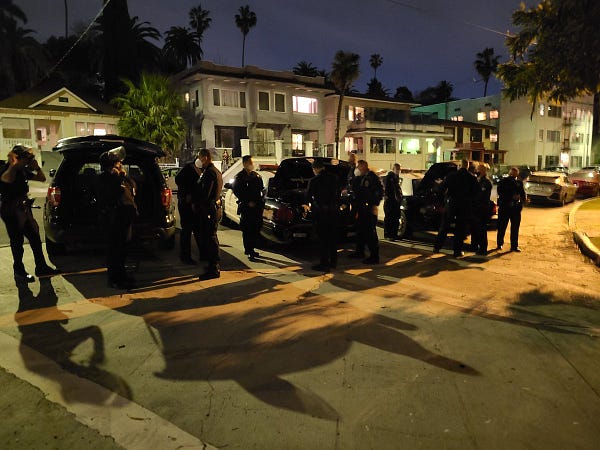
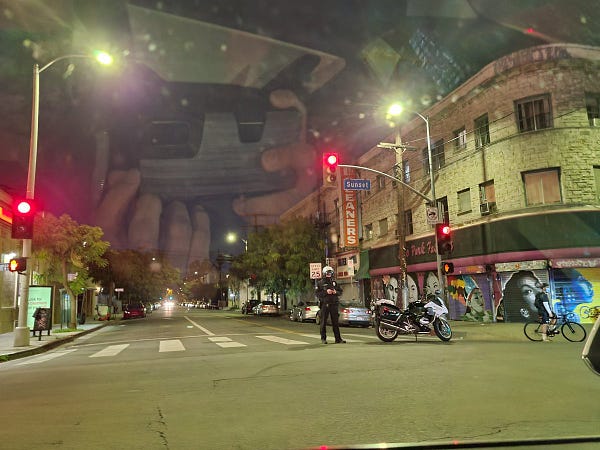
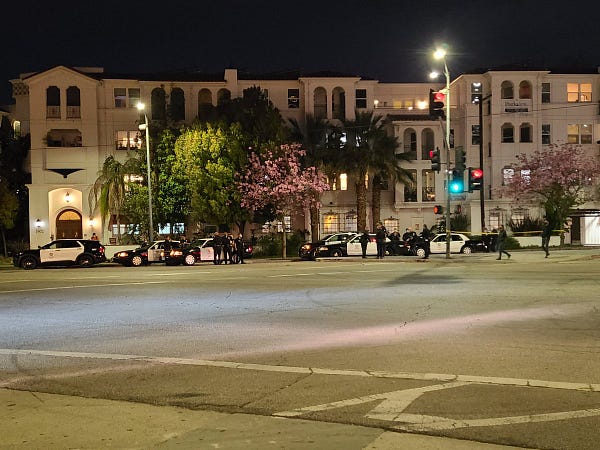
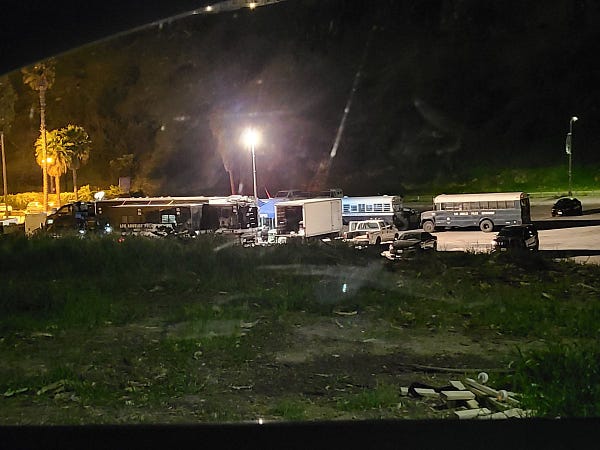
Evgenia and I have spent a lot of time at Echo Park Lake ever since we moved back to Los Angeles. We’ve seen the homeless camp there grow from just a few random tents to an impressive commune-type arrangement — with outdoor showers, a pantry, a place where people can donate and take clothes and tents and other necessities. At some point, the place began to feel more like a self-organized refugee camp, which is exactly what it was — a camp housing people displaced by economic and political warfare.
A lot of great people have helped make the camp at Echo Park Lake a reality. Early on, right before the pandemic, activists helped defend the camp from police and sanitation” raids. And they have since helped it grow and achieve stability. Although Evgenia and I haven’t been involved, we’ve donated a few things over the months to people living here.
Some will scream at you about the encampment being an eye sore or dangerous or unsanitary. But I think the camp’s made the park much better — turning a largely decorative space into a livable habitat. If someone has to be homeless, living in a park — with lawns, trees, and wide open spaces — seems so much better and safer than being forced into the dirty and toxic margins of Los Angeles society: into gutters, next to freeways, under overpasses, on onramps. All parks should be used this way — as staging areas for temporary housing for the displaced. There’s a war going on — and it’s incredible that people think they’re entitled to stroll comfortably around well-manicured public green spaces, with their views uncluttered by the reality of the poverty and squalor of the society they inhabit.
The camp at Echo Park Lake is unique. So of course the political response by this liberal, Democratic Party city is to destroy and scatter it, to push it out of sight. There’s nothing strange about it. I remember that back when Trump was around, Los Angeles’ mayor was in talks with his administration, cooking up a plan to build homeless camps on federal land somewhere far out of the city — concentration camps most likely in the Mojave Desert, where there is plenty of federal land. The attack on Echo Park Lake is this same strategy just on a smaller scale: don’t address the problem, simply push it out of sight.
As it stands, Echo Park Lake has been fenced off and the cops say they are returning tonite in force to finish the job they started.
—Yasha Levine
PS: I hope to make it out to the park later today. In the meantime, I want to repost something I wrote a year ago about the concepts and language we use when talking about homelessness: “Soviet Jewish refugees like me, Syrian refugees, Iraqi refugees, Bolivian refugees, and, hell, even Ukrainian Nazi collabos fleeing justice at the hands of the Red Army — all these groups are allowed to be seen as victims of external forces outside their control. But the homeless are given no such privilege. Their homelessness and misery and victimization is supposed to be their own fault. It’s all tied to personal choices they made — choices that exist completely outside of external political forces.”
Letter from LA: The homeless are internal refugees — victims on the run from neoliberalism
Yasha Levine • Mar 23, 2020
Ever since we moved back to LA, I’ve been shocked and horrified by how bad the homeless situation here has gotten in the years that we’ve been gone. And while everyone here is aware of this “problem,” no one with any real political power is willing to do anything about it — because to do so would require totally reconfiguring the way our society operates. Instead, the only thing that people here agree on is that it’s probably best to ship the homeless to gulags far away from the city. Way before corona hit, this been big area for agreement between local anti-Trump liberals and the Trump Administration.
Now with corona and the shutdown, the homeless “problem” has been pushed to forefront — with the Los Angeles Times doing cover story after cover story on the threat the virus poses to the unhoused and, by extension, the general population of LA. But again, other than cramming people into makeshift and poorly equipped shelters — shelters that could very well become a breeding ground for the virus — no one’s really doing anything. And while the city is on lockdown, there are reports from all over LA that city officials are still pushing the homeless out of their camps and seizing their property. And I won’t be surprised if, in the end, the city uses the corona crisis as cover for its partnership with the Trump government to ship the homeless out of the city and into quarantine gulags.
Does that look like 6 feet between cots to you? I’d say 3 feet max — if that.
But there’s that word: the homeless.
As a refugee myself — and as someone who’s been studying the history of refugees and “displaced persons” — it’s become clear to me that “homelessness” isn’t the best word to describe what’s happening here. It makes the whole thing seem so disembodied and abstract.
The truth is that homelessness is fundamentally a refugee crisis — an internal refugee crisis caused by economic and political warfare. The United Nations has a pretty good bureaucratic term to describe the tens of thousands of homeless here in LA: “internally displaced persons.”
Internally displaced people (IDPs) have not crossed a border to find safety. Unlike refugees, they are on the run at home. IDPs stay within their own country and remain under the protection of its government, even if that government is the reason for their displacement.
Naturally, the UN leaves out economic policies as a driver of IDPs and mostly restricts its definition to wars and natural disasters. That’s expected in our neoliberal world — where economic power has been written out of the everyday realm of politics and remade into an immutable law of nature. But put economics and politics back into the realm of human warfare (where they belong) and there’s just no getting around how well “IDP” fits the homeless.
The fact is our government and our society has been directly responsible for the internal displacement of these people. On just about every level — from local to state to federal to cultural and personal — our establishment has waged a political war against its own society on behalf of corporate and private power. The vast majority of us have been on the losing side and everyone’s been dealing and coping with this assault in whatever ways they can. The poorest and most vulnerable among us are just the most visible casualties of this war. They have nowhere else to flee, nothing to retreat to. So they’re scattered all over the streets here like human wreckage.
The coronavirus is exposing this political war like nothing else I can remember — and it’s gonna simply decimate the homeless.
Echo Park, Los Angeles
So the homeless are internal refugees — victims on the run from neoliberalism. But there is one big difference between the homeless and other “accepted” IDPs and refugees: the homeless are not allowed to have a sympathetic narrative.
Soviet Jewish refugees like me, Syrian refugees, Iraqi refugees, Bolivian refugees, and, hell, even Ukrainian Nazi collabos fleeing justice at the hands of the Red Army — all these groups are allowed to be seen as victims of external forces outside their control. But the homeless are given no such privilege. Their homelessness and misery and victimization is supposed to be their own fault. It’s all tied to personal choices they made — choices that exist completely outside of external political forces.
This narrative denial makes sense. Our political elite can’t smugly say that homelessness here is the fault of communism or that it was caused by the undemocratic policies of some bad authoritarian government. It can’t blame it on something foreign and external. And it can’t weaponize the homeless in service of its own ideology and power — like my fellow Soviet Jewish refugees and I were during the Cold War.
Our society is to blame for this disaster. It’s the one that’s waging war against its own people. And those in power today — whether liberal or Trumpist — do not want to stop it.

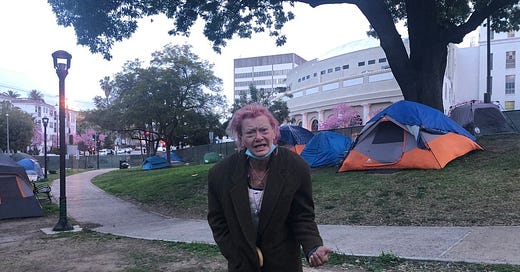

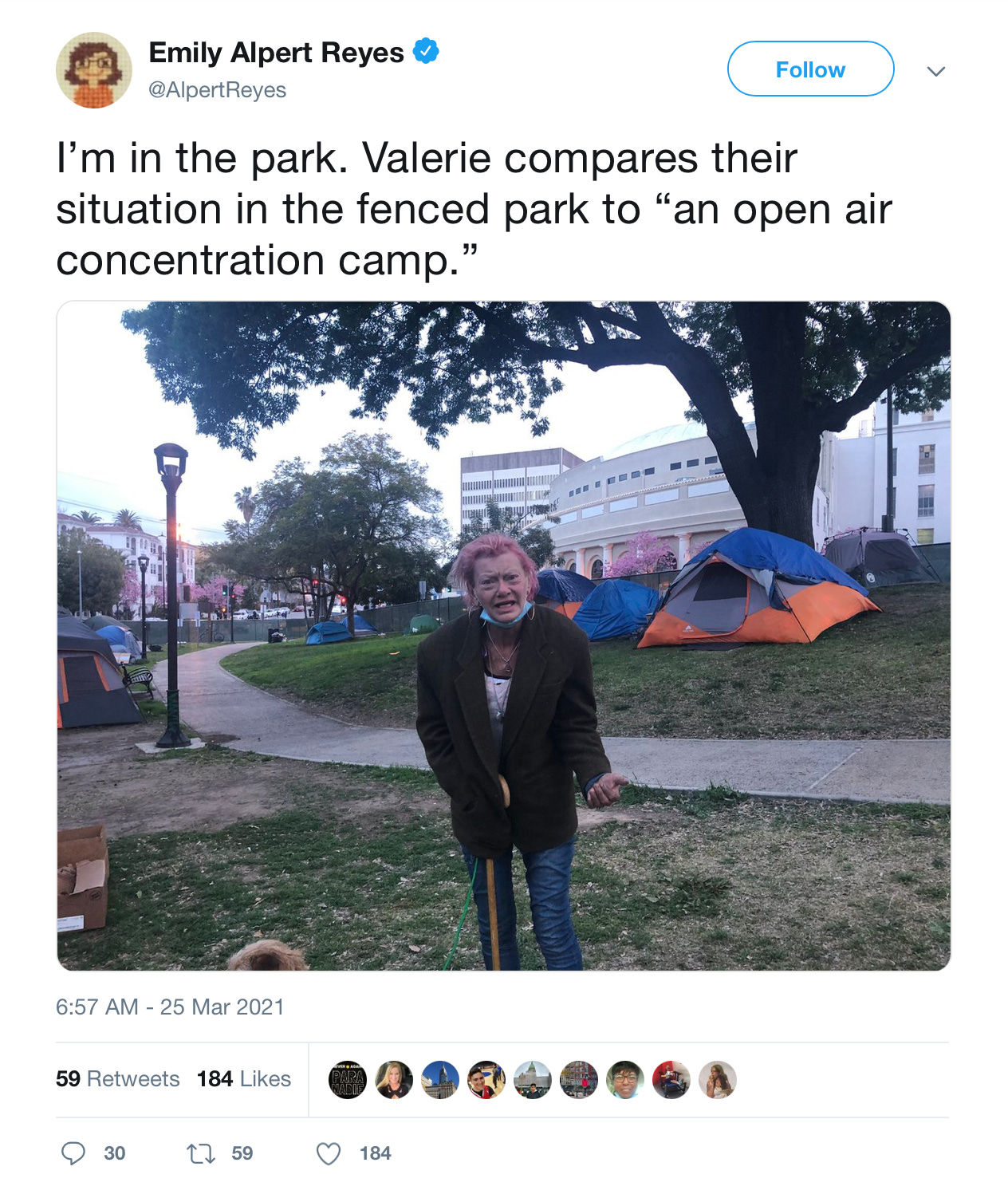
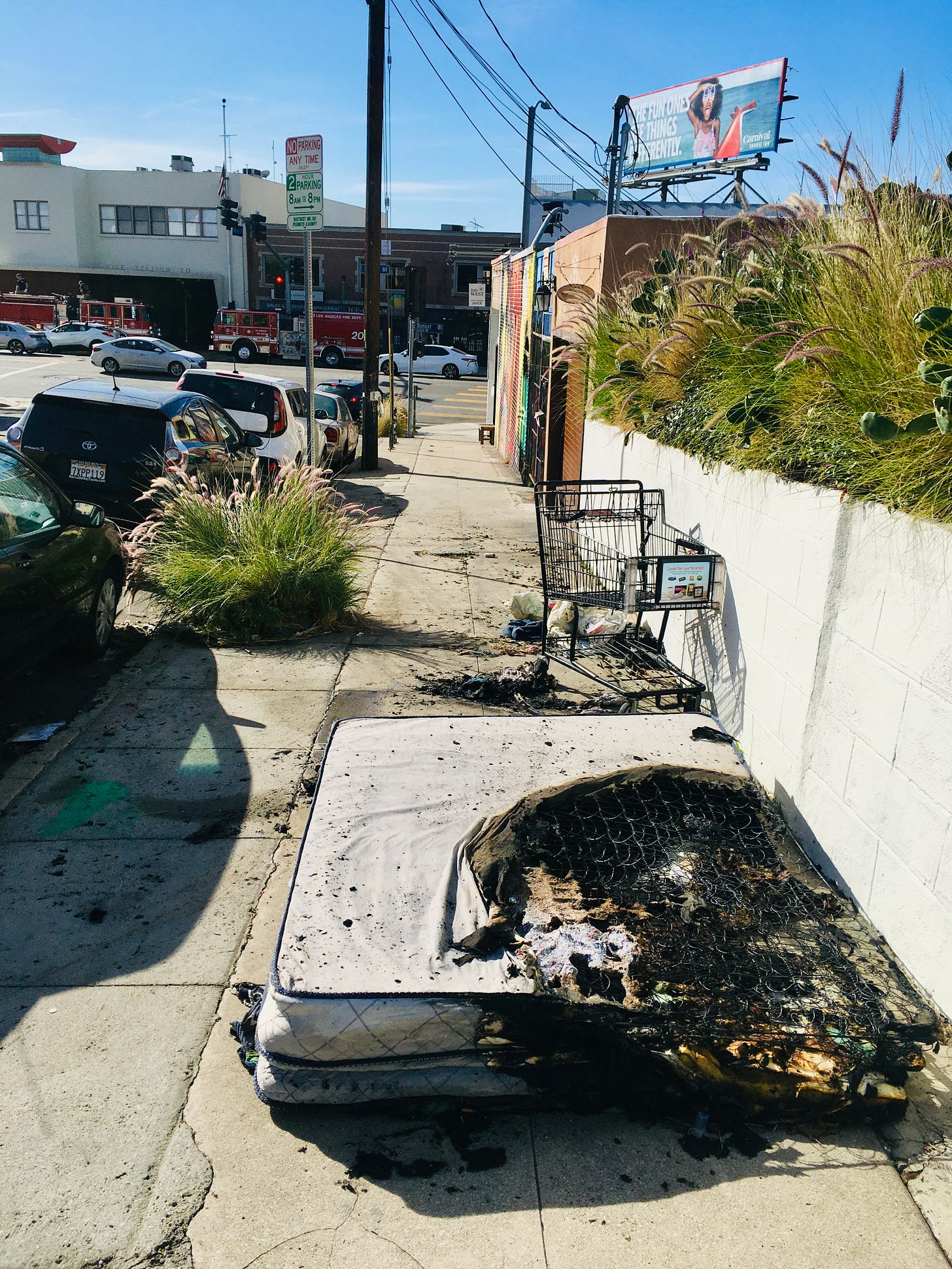
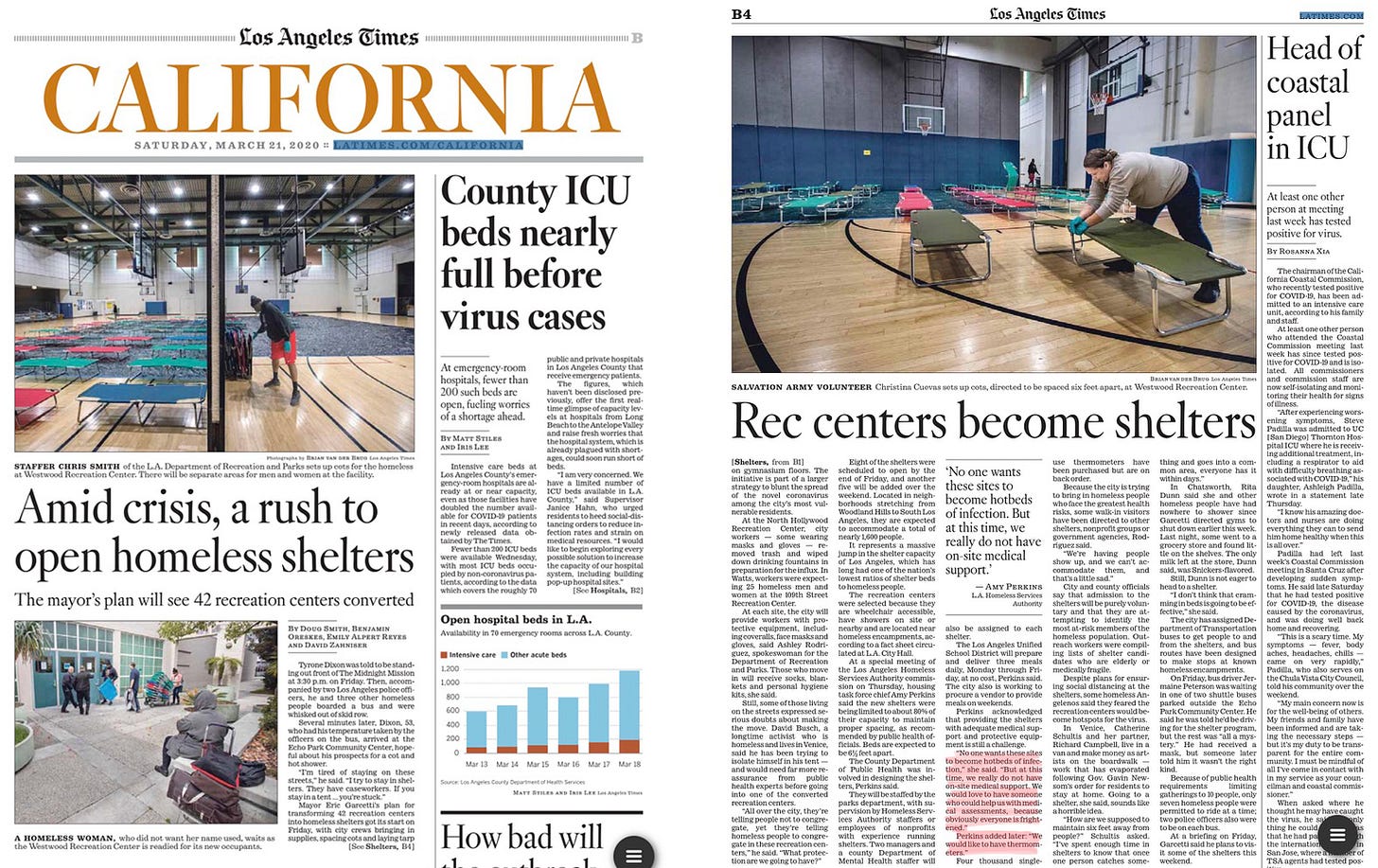

Pieces of shit on an absolutely cosmic scale. Where does it end, and how does it scale up in the face of climate catastrophe? Mass migrations, increasingly “irrelevant” labor, and bog standard neoliberal fuckery with essential social programs… it’s hard not to envision the darkest possible timeline, and yet. Somehow I remain optimistic. I’ve lived through a people being pushed past their breaking point. I was old enough to remember the overwhelming will of an entire country tossed aside, in what I’m sure the West thought was the scaled up equivalent of clearing out a camp of the unhoused.
Headlines (lol bourgeoisie) be damned, you can sense the undercurrents of, if not class consciousness, a rising awareness that the economy demands a pace so brutal that we can’t keep up. So yeah, I’m optimistic. It’s gonna be a hell of a 21st century.
Hi Yasha,
I have just discovered your work thanks to your interview on Moderate rebels, for which I thank you. I am very interested in the issues you raise, from particular perspective of Afghanistan and refugees therefrom- but I completely agree with your generalisation of issues of internal and external displacement to bring out the wider relevance of specific cases. Did you know that the spread of Afghan refugees into Western Europe- probably also USA- has had the consequence of spreading cricket into countries where it had not been played? And that the origin of cricket in Afghanistan is from Afghans time in refugee camps in Pakistan- not a legacy of the 19th cent British invasions? Why might I imagine that of potential interest to you? Because cricket is proving such a remarkable support bridge for refugees in their new country- because international cricket has become culturally diverse as the former colonies gained strength, and this means that refugees who are cricket players have a strand of ‘language’ and culture which is respected in host countries even before they learn the host’s language. And I am sure that with your direct understanding of a refugee cultural journey, you will be alert to what a difference that can make. When I look at the figures on numbers of refugees and displaced persons globally, and reflect on the multi- generational process for each person who tries to make a home in a new culture- it is truly a formidable position the world is in. Are there Afghans in LA? Is there a way for them to play cricket anywhere?